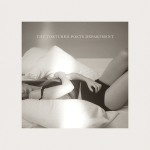
Taylor Swift The Tortured Poets Department
(Republic)
I woke up today to the shocking reality that No Ripcord is a quarter of a century old. Older than YouTube, Facebook, Twitter — and certainly too old to call that particular hellscape by its new name. This shabby little website has been around longer than many of the artists we review and long enough to outlive many of our contemporaries. Since our humble beginnings in 1999, No Ripcord has acclaimed countless classic albums, interviewed some of our heroes, and apologised profusely for hyping Coldplay’s debut. We’ve received death threats, survived plagiarism scandals, and lost Twitter spats to a supremely pissed off Luke Haines. It’s been a wild ride and we’ve lost a ton of money along the way, but I wouldn’t actually change a thing. Ok, maybe I wouldn’t have published that Merriweather Post Pavilion review. Or anything by certain film critic who shall remain nameless. But that’s all. I’m pretty happy with our 25 year run.
If that seems like a lot of context, it’s nothing compared with the required reading for Taylor Swift’s The Tortured Poets Department. A garguantuan record in every sense, its impact seems heavily dependent on the listener’s level of investment in Swift’s personal journey. More than any of her earlier releases, this feels like one for the fans; an extended Easter egg hunt for the diehards to analyse and consume. And I can see the allure. I enjoy references and in-jokes as much as anyone, but I lack the contextual knowledge to appreciate all of Swift’s barbs.
For a record-breaking cultural juggernaut, The Tortured Poets Department sounds oddly dated. Swift obviously has a strong working relationship with her co-producers Jack Antonoff and Aaron Dessner, but I feel like she needs a sonic refresh at this point. Antonoff especially has a very particular signature sound and several moments here evoke his work with Lana Del Rey and Lorde. As much as I really don’t rate him as a performer, I do believe Antonoff is a talented producer — but his working relationship with Swift appears to have slipped into a comfortable territory and it’s tempting to conclude that their best work together is behind them. Perhaps tellingly, the two best Antonoff co-productions on the record are both solo Swift compositions, the poignant My Boy Only Breaks His Favourite Toys and the more anthemic Who’s Afraid Of Little Old Me?
Elsewhere, there are hit and miss collaborations; Post Malone offers little to the forgettable opener Fortnight, while the soaring Florence Welch duet Florida!!! provides a welcome mid-album highlight. I focused my listening on the core 16 tracks (65 minutes), but The Anthology version adds an additional 15 tracks (a further 57 minutes). More content, more lyrics to dissect, more streams if you’re being cynical. All this comes at the expense of quality, as best exemplified by the pedestrian Aaron Dessner collaboration I Hate It Here, which features the album’s oddest line about wanting to live in a racist-free (and presumably largely unpopulated) version of 1830s. Taylor Swift has certainly written some great lyrics in her time, but this is more tortured poetry than tortured poet. It’s basically a b-side collection (Google it).
Taylor Swift is an icon. She’s made some phenomenal music in her career and a handful of songs on The Tortured Poets Department are welcome additions to her canon. These are sadly outnumbered by bland filler and compromised by an overwhelming sense of stasis. Swift may be at the height of her commercial powers, but could this be the beginning of her artistic decline? I hope not, but nothing lasts for ever. Not even music review websites.
28 April, 2024 - 20:39 — David Coleman